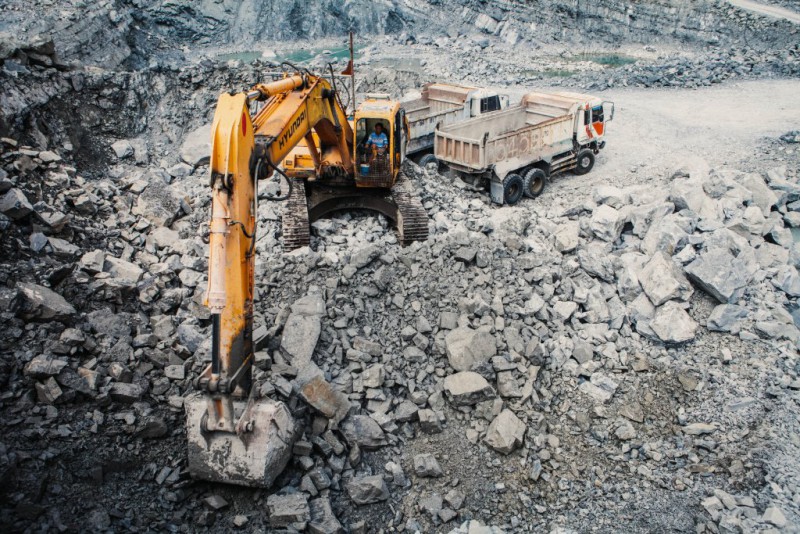Intensifying tax management for enterprises, organizations, and individuals engaged in business activities using construction materials such as soil, sand, stone, and gravel
The article below will provide content on intensifying tax management for enterprises, organizations, and individuals engaged in trading using construction materials such as soil, sand, stone, and gravel in Vietnam.

Intensifying tax management for enterprises, organizations, and individuals engaged in business activities using construction materials such as soil, sand, stone, and gravel (Image from internet)
On October 30, 2024, the General Department of Taxation of Vietnam issued Official Dispatch 4902/TCT-TTKT concerning the intensifying of tax management for enterprises, organizations, and individuals engaged in the business of using construction materials such as soil, sand, stone, gravel.
Intensifying tax management for enterprises, organizations, and individuals engaged in business activities using construction materials such as soil, sand, stone, and gravel
The General Department of Taxation of Vietnam requests the Tax Departments to implement the following tasks:
(1) Regarding promotional and supportive work:
- Regularly propagate and guide taxpayers and citizens regarding regulations on the exploitation, trading, transportation, and use of mineral resources, paying special attention to groups of minerals used for construction materials such as soil, sand, stone, gravel ... which must have legal origins and be accompanied by complete invoices and documents proving their origin. Implement promotion in various forms such as conferences and seminars with businesses, agencies, and branches in the locality to garner support and coordination. Tax Departments should publish legal documents related to the declaration, payment of taxes, fees, and the use of invoices and documents, along with sanctions for activities in the mining sector according to statutory provisions on the Tax Department's website and local TV and newspaper tax sections to guide taxpayers, while also warning them to avoid legal violations.
(2) Regarding tax management work:
- Review and establish a list of taxpayers (including business households, individuals, and enterprises) involved in the extraction, trading, purchasing, and use of soil, stone, sand, and gravel to monitor and manage. Regularly update the list according to actual situations.
- Strictly manage taxpayers' tax declarations and payments.
- Classify taxpayers according to risk levels to carry out tax management under regulations.
- Assign a unit as the main focal point to monitor changes in tax declarations of taxpayers (soil, stone, sand, gravel) to detect early risks for warning or report to tax authority leaders for prompt handling and compile periodic reports to superior agencies.
(3) Regarding inspection and audit work:
Strengthen inspection and audit work concerning enterprises with high tax risks to prevent, detect, and handle legal violations about tax in the mineral resources business sector: soil, stone, sand, gravel, including audits at tax offices and inspections and audits at taxpayer headquarters. Specifically:
- Conduct reviews and audits of tax filing documents at tax offices for enterprises, organizations, individuals engaged in business using construction materials such as soil, sand, stone, gravel in the area. In case of high risk detection, formulate a plan, conduct inspections at taxpayer headquarters.
- During tax office inspections or audits and inspections at taxpayer headquarters, pay close attention to the use of input invoices and vouchers for these goods, specifically:
+ Verify and cross-check purchase and sales invoices of enterprises, organizations, individuals in the business of using construction materials such as soil, sand, stone, gravel; if necessary, trace to determine the legal origin of the goods, and the legal validity of the invoices. If high risks are detected, conduct inspections at units providing soil, stone, sand, gravel at commercial business stages and units performing mining at the mines.
+ For taxpayers that are units implementing projects, construction works, and transport works, during audits and inspections, pay attention to construction estimates, acceptance dossiers, payment, final settlements; review invoices for purchasing construction materials such as soil, sand, stone, gravel to consider the legal origin of these materials used; the actual use compared to work estimates or settlements; compare actual quantities of soil, sand, stone, gravel purchased for use in projects, construction works with exploitation capabilities and licensed exploitation in the locality to determine reasonableness or detect risks.
+ In cases where the taxpayer is a unit exploiting, trading soil, stone, sand, gravel with high risks, when inspecting outbound goods, pay attention to cross-checks on quantities and harvested volumes. Following the transfer of tax declaration information (output volumes of soil, stone, sand, gravel exploited per mine, per Mining License) in the year, the tax authority must actively urge and coordinate with the Department of Natural Resources and Environment to provide information on resource volume, removed overburden volume, waste rocks, and actual mined minerals for consolidation, juxtaposition, and tax handling per the Law on Tax Administration and related tax laws.
- The Tax Departments shall direct departments, district tax branches regularly to review and cross-check the use of invoices of enterprises utilizing soil, sand, stone, gravel as per warning documents provided by relevant agencies.
- In cases where violations are detected, such as using illegal invoices or illegally using invoices to falsify costs or legitimize purchased or sold goods, based on the nature, severity of the violation, and legal regulations, take strict actions to recover taxes, impose administrative fines, and transfer dossiers to the Police for handling criminal law violations under regulations.
- Key word:
- tax management
- Construction Material
- Vietnam
- Number of deputy directors of departments in Vietnam in accordance with Decree 45/2025/ND-CP
- Cases ineligible for pardon in Vietnam in 2025
- Decree 50/2025 amending Decree 151/2017 on the management of public assets in Vietnam
- Circular 07/2025 amending Circular 02/2022 on the Law on Environmental Protection in Vietnam
- Adjustment to the organizational structure of the Ministry of Health of Vietnam: Certain agencies are no longer listed in the organizational structure
- Vietnam aims to welcome 22-23 million international tourists in Vietnam in 2025
-

- Number of deputy directors of departments in Vietnam ...
- 15:04, 05/03/2025
-

- Cases ineligible for pardon in Vietnam in 2025
- 14:43, 05/03/2025
-

- Decree 50/2025 amending Decree 151/2017 on the ...
- 12:00, 05/03/2025
-

- Circular 07/2025 amending Circular 02/2022 on ...
- 11:30, 05/03/2025
-

- Adjustment to the organizational structure of ...
- 10:34, 05/03/2025
-

- Notable new policies of Vietnam effective as of ...
- 16:26, 11/04/2025
-
.Medium.png)
- Notable documents of Vietnam in the previous week ...
- 16:21, 11/04/2025
-
.Medium.png)
- Notable documents of Vietnam in the previous week ...
- 16:11, 02/04/2025
-
.Medium.png)
- Notable new policies of Vietnam to be effective ...
- 16:04, 02/04/2025
-
.Medium.png)
- Notable new policies of Vietnam effective from ...
- 14:51, 21/03/2025

 Article table of contents
Article table of contents
